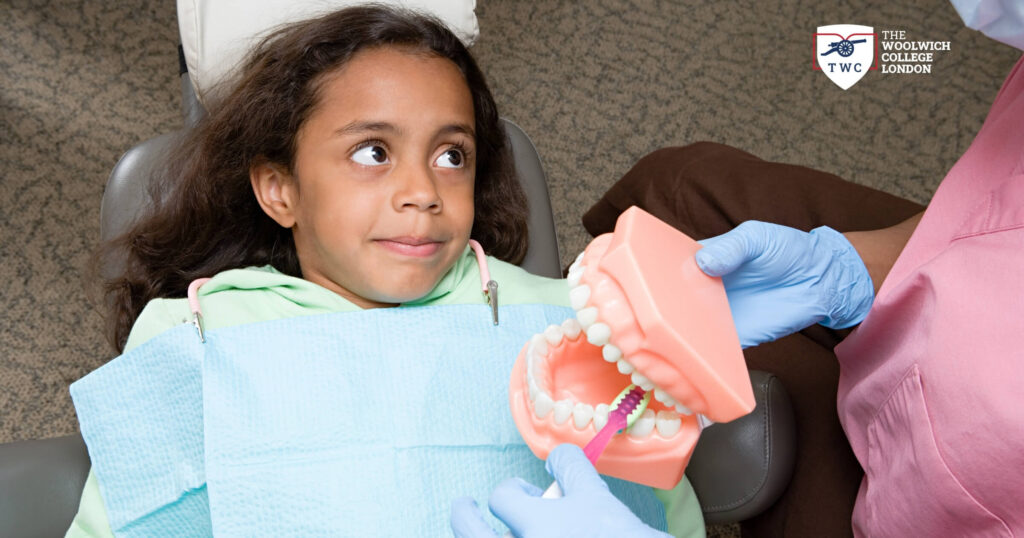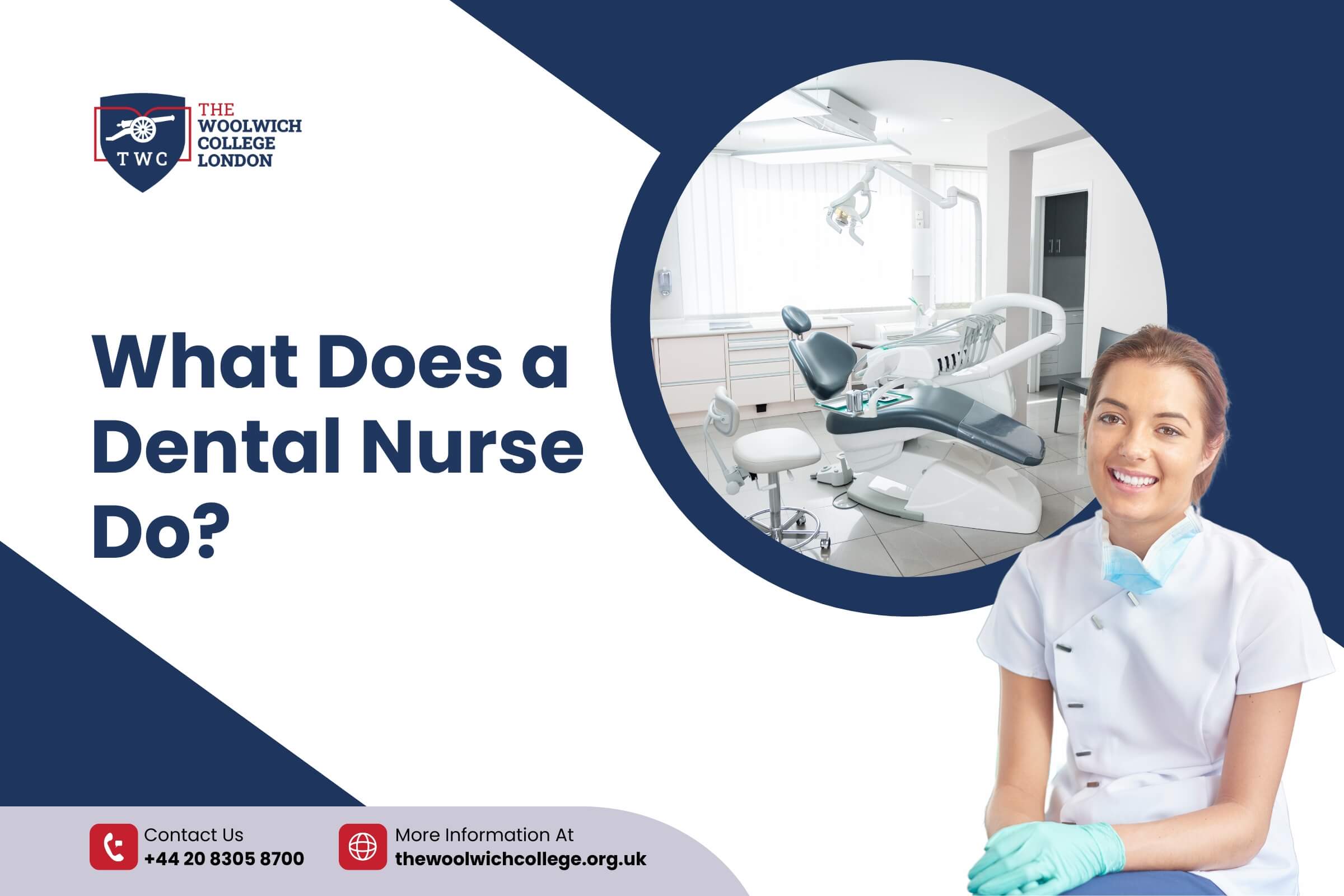So what does a dental nurse do to help a dental practice run smoothly and keep patients comfortable and safe? A dental nurse is part of the dental team, working alongside dentists and other professionals to deliver patient care. From assisting with treatments to managing infection control and dental administration, the role is varied and important. Outside of the clinical environment, they are educators, advocates and organisers, making sure every part of the patient journey is seamless. With technical skills and communication skills, they are essential in general practices and specialist practices. But what does this role actually entail and how can you succeed in it? Let’s get into the nitty-gritty.
What is a Dental Nurse?
Before we get into what does a dental nurse do let’s first understand what is a dental nurse and why they are so important to the dental team. A dental nurse is a healthcare professional who works alongside dentists, hygienists and therapists to ensure the smooth running of dental procedures while putting patient care first. They are not just assistants but key players in a dental practice. From preparing materials for treatment to reassuring anxious patients, their role is varied and essential. Beyond clinical duties dental nurses also do administrative tasks like managing appointment schedules and patient records and ensuring compliance with laws and regulations.
But what makes a dental nurse truly special is they can wear many hats—clinical assistant, patient advocate, infection controller, health educator and practice supporter. Let’s look into each of these roles.
What are the Key Roles of a Dental Nurse?
Dental nurse duties span many responsibilities, each vital for maintaining high standards within a dental practice. Let’s look at the main jobs that make up this role.
Clinical Assistant
As a clinical assistant, you prepare and manage treatment. This includes instruments, setting up the treatment room and chairside support. Your work ensures clinical work runs smoothly and on time, and contributes to great patient care.
Patient Advocate
As a patient advocate, you support by explaining treatment and making patients feel at ease during their visit. This role involves listening to concerns and reassuring, so patients understand their treatment plan. You become the patient’s go-to person for guidance, making the dental experience less scary and more personal.
Infection Controller
Infection control is a key responsibility. Here you maintain high standards of cleanliness by sterilising instruments and making sure treatment rooms are ready for use. This part of the role is crucial to prevent cross-contamination and protect patients and staff. The focus on infection control shows you care about a clean clinical environment.
Health Educator
As a health educator, you educate patients on oral hygiene and preventative care. By giving them advice on how to brush and the importance of regular check-ups you help patients take control of their dental health. This educative part reinforces the role of the dental nurse in long-term health.
Practice Supporter
As a practice supporter, you help the smooth running of the dental office. This includes administrative tasks such as record keeping, supply management and appointment scheduling. Your organisational skills mean clinical and non-clinical tasks are managed efficiently and you are an integral part of the dental team.

What are the Core Responsibilities of a Dental Nurse?
Knowing what a dental nurse does means understanding the many jobs that keep a dental practice running. From setting up a clinical environment to managing admin tasks, each job is important. Let’s look at the core areas where dental nurse jobs make a difference.
Pre-Procedure Preparation
Before a procedure begins, careful preparation sets the stage for success.
- Clinical Environment Setup
You set up the treatment area by laying out dental instruments and making sure all equipment is in place and the room is hygienic. This prep sets up the procedure for success and patient care.
- Patient Preparation
Here you get the patient ready and relaxed. By explaining what’s going to happen and answering their questions you reduce anxiety and build trust. This is key to the overall dental experience.
Intra-Procedure Assistance
During the procedure the dental nurse is the dentist’s right hand, helping everything to run smoothly.
- Chairside Support
You hand instruments and do essential tasks while the dentist is treating you. This hands-on role means the procedure runs smoothly and safely.
- Patient Monitoring
You monitor the patient’s comfort and well-being. Monitoring vital signs and dealing with any immediate issues keeps the clinical environment safe throughout the treatment.
Post-Procedure Duties
After the procedure, your role changes to post-procedure care and preparation for the next patient.
- Patient Instructions
You give the patient post-treatment instructions, explaining how to manage discomfort and oral hygiene. This is key to continued recovery and patient satisfaction.
- Instrument Sterilisation and Room Turnover
A clean and tidy environment is maintained by sterilising instruments and preparing the room for the next patient. This upholds the high infection control standards expected in dental nursing.
Patient Education (Ongoing)
Ongoing patient education is part of your job, for long-term oral health.
- Oral Hygiene Instruction
You share simple tips on brushing, flossing and overall oral care. By giving clear guidance you empower patients to take control of their mouths.
- Preventative Care Counseling
Patients are advised on the benefits of regular checkups and healthy habits. This education helps patients understand the importance of preventative care, which is at the heart of the dental nurse’s role.
Administrative Tasks
Beyond clinical duties, efficient administration is what keeps the practice running.
- Record Keeping
Patient histories and treatment records need to be kept up to date. This task supports patient care and compliance.
- Supply Management
Inventory of dental supplies, ordering and keeping stock levels topped up. This prevents delays and allows the practice to continue to run.
- Scheduling and Communication
Coordinating appointments and communicating with patients is key. This keeps the schedule organised and patients informed.
Each of these tasks, clinical or administrative, is part of the answer to “what does a dental nurse do?” and shows the big impact they have on patient care and practice efficiency.

Where Does a Dental Nurse Work in the UK?
Dental nurses work in various environments, each with its own experiences that answer the question, “what does a dental nurse do” in different settings. Let’s take a look at the places where dental nurse duties come to life.
General Dental Practices
In general dental practices, dental nurses are part of the dental team. Here you’ll be doing routine tasks such as preparing treatment rooms, assisting during procedures and ensuring patient care is with a high standard of infection control. This is the place if you like a busy environment where every day is different.
Hospitals and Private Specialist Clinics
In hospitals and private specialist clinics, your role as a dental nurse is more clinical. You’ll be working with a variety of healthcare professionals and assisting with complex dental procedures and comprehensive patient care. This is the place to gain exposure to advanced dental techniques and work within multi-disciplinary teams.
Community and Public Health Settings
Dental nurses in community and public health settings focus on wider patient care initiatives. You’ll be contributing to oral health campaigns and preventive care projects that educate the public and promote better oral hygiene. In this role, you’ll be supporting community wellness by reaching out to diverse populations.
Armed Forces
A less commonly known but highly rewarding path is working as a dental nurse in the Armed Forces. In this role, you’ll provide dental care to service personnel, often in challenging or remote locations. The Armed Forces value dental nurses, with structured career progression, competitive salaries and travel opportunities. If you thrive under pressure and love an adventure then this is the role for you. Plus the Forces provide full training so you’ll be ready for anything.
Each workplace offers a different perspective on dental nurse duties and responsibilities, contributing to a well-rounded career in dental nursing.

What are the Essential Skills for Success as a Dental Nurse
Success as a dental nurse comes from a mix of technical knowledge, clear communication and strong personal qualities. If you’re exploring ‘how to become a dental nurse,’ developing these skills will set you on the right path. Each of these skills supports your daily duties from handling procedures to patient care and practice admin.
Technical Competencies
In your role, you need to have technical skills. You will be expected to operate and maintain dental equipment, follow infection control protocols and support various dental procedures with precision. Master these skills and you can adapt to any clinical situation and ensure every procedure is safe. Understanding instrument care and sterilisation processes not only improves patient care but also a smooth-running practice.
Interpersonal Skills
Strong communication and teamwork are at the heart of dental nursing. You will be interacting with patients, explaining procedures and reassuring them. Clear and friendly communication builds trust and lets patients feel supported throughout their treatment. Working with dentists and other team members you need to listen and communicate clearly. These skills make your role as a dental nurse more effective and creates a collaborative working environment.
Personal Attributes
Certain personal qualities are essential for being a good dental nurse. Being organised and having an eye for detail means you manage clinical and administrative tasks effectively. A calm under pressure and a caring approach to patients means you can handle any situation with confidence. Just like a skilled craftsman pays attention to every detail of their work, your attention to detail and care makes all the difference in every aspect of dental nursing.
What Career Development Opportunities are there for a Dental Nurse
For those wondering “what does a dental nurse do” beyond their day-to-day responsibilities, as well as “how long does it take to become a dental nurse,” career development opportunities offer exciting pathways to grow professionally and personally. From advancing clinical skills to leadership roles, the journey of a dental nurse is one of continuous learning and progression. Let’s look at how Continuing Professional Development (CPD) and clear career paths can shape your future in this exciting field.
Continuing Professional Development (CPD)
Investing in ongoing learning is key in dental nursing. CPD activities help you stay up to date with current practices and build on your clinical and admin skills. The Woolwich College London, a well-established Further Education College in London, offers courses like the City and Guilds Level 3 Diploma in Dental Nursing and the NEBDN Level 3 Diploma in Dental Nursing. These qualifications will deepen your knowledge and prepare you for a successful career in dental nursing. They cover everything from clinical duties to infection control and patient care so every dental nurse is ready for everyday challenges. These qualifications also increase your credibility within the dental team and show you’re committed to delivering high-quality care.
Career Advancement Paths
Beyond CPD, there are many routes for career advancement in dental nursing. For example, many dental nurses choose to specialise by training to become a dental hygienist, dental therapist or orthodontic therapist, roles that allow them to take on more clinical responsibilities. Others may go into leadership roles such as managing a dental practice or overseeing a team of dental nurses.
Or if you’re looking to move outside of clinical roles, your experience as a dental nurse can open doors to careers in healthcare administration, medical sales or even teaching. These roles use your medical knowledge and patient care skills but offer new challenges and opportunities.
Whatever path you choose, starting with a solid educational foundation is key. And The Woolwich College London can help you build the skills and confidence to get there. Ready to get started? Contact us today to find out how our courses can change your career.

How Much Does a Dental Nurse Earn in the UK?
When looking at what does a dental nurse do on a daily basis, we also need to consider the financial side. In the UK according to Glassdoor, a dental nurse’s salary is usually around £22,000 to £28,000 a year depending on your experience, location and where you work. Data from various salary platforms shows the average dental nurse salary is approximately £24,121 a year. In London where living costs are higher, dental nurses can get an hourly rate of around £14.41, that’s the going rate in the capital.
Your pay can also vary depending on whether you work in a private practice, a general dental practice or within the NHS. NHS roles follow a structured pay scale, private practices might pay more and offer more incentives. For example, entry-level positions start at around £23,615 a year and with additional qualifications or specialist training in areas like infection control or chairside assistance, experienced dental nurses can earn up to £28,743 a year or more.
Beyond base salary, many dental nurses get benefits like pension contributions, bonuses and opportunities for overtime or locum work. These additional perks make the overall package more attractive and support career development in dental nursing. As you build your skills in clinical duties and dental administration, your ability to negotiate better pay grows, because you’re an integral part of patient care and the dental team.
Frequently Asked Questions (FAQ)
Is dental nursing stressful?
Dental nursing can be tough, but whether it’s stressful is down to individual resilience and the practice you work in. A recent survey found that 85% of dental nurses have experienced mental health issues over the last 3 years, often due to workload or patient-related stress. But many find the job really fulfilling when they feel supported by their dental team. Practices that put staff well-being first and provide sufficient training tend to be less stressful.
Do dental nurses perform cleanings?
Dental nurses support the dentist during procedures but don’t do cleanings themselves. Cleanings are usually done by dental hygienists or therapists who have completed specific training for those treatments. Dental nurses may assist during cleanings and educate patients on oral hygiene and the importance of preventive care.
Can dental nurses work part-time?
Yes, dental nurses can work part-time and many do to achieve a better work life balance. Whether in general practices, hospitals or community settings, flexible hours are often available. This flexibility makes the job appealing to those with family commitments or studying. If you’re considering part-time work discuss your needs with potential employers to find a schedule that suits you.
What qualifications are needed for a dental nurse?
To be a dental nurse you need formal qualifications recognised by the GDC. Popular options are the City & Guilds Level 3 Diploma in Dental Nursing and the NEBDN Level 3 Diploma in Dental Nursing which are offered by Further Education Colleges such as The Woolwich College London. These courses cover clinical duties, infection control and patient care and will prepare you for registration as a qualified dental professional. If you want structured learning pathways these are a great starting point.





